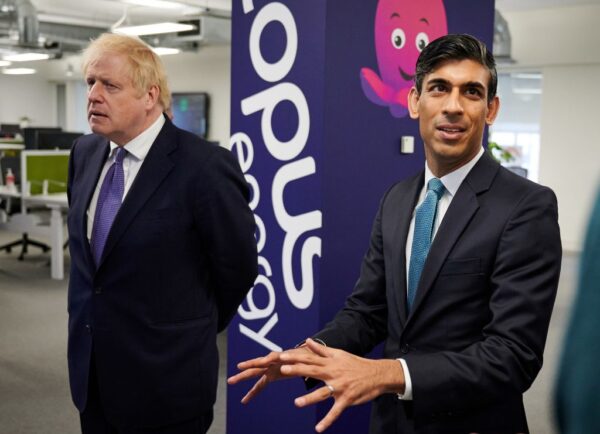Unearthed today: Building back a green and pleasant land?

The UK government is looking to unveil a multi-pronged and potentially significant package of measures to reduce emissions from the power and transport sector – according to the FT and Guardian this morning.
“We believe that in 10 years’ time offshore wind will be powering every home in the country, with our target rising from 30 gigawatts to 40 gigawatts,” he will say. “Your kettle, your washing machine, your cooker, your heating, your plug-in electric vehicle – the whole lot of them will get their juice cleanly and without guilt from the breezes that blow around these islands.”
The speculation comes ahead of a speech by the somewhat beleaguered Prime Minister Boris Johnson at this year’s virtual party conference in zoom land. Faced by a pandemic which stubbornly refuses to be tamed the PM is reportedly desperate to seize back a sense of policy initiative and sees green growth as a way to do that, especially with the UK set to host a major climate summit next year.
The move also provides an economic vision at a time of rising mass unemployment, even though the jobs and mass unemployment are unlikely to coincide very precisely.
“The prime minister is expected to unveil the multibillion-pound initiatives at the end of October, just as the jobs furlough scheme comes to an end, in an attempt to show the government has a long-term economic plan beyond the coronavirus pandemic,” the FT reports.
The detail is a little hazy, but reports suggest a repeat of the manifesto commitment to install a (genuinely) world-leading 40GW of offshore wind by 2030, a phase-out of petrol engines by the same date alongside initiatives on hydrogen, mini-nuclear reactors, floating wind turbines, carbon capture and storage and all the clever techy sounding things Cummings can put in a list.
There’s so much here that some of it seems likely to happen – but beware of embattled politicians and their short-attention spanned advisors bearing policy gifts. The UK government has a hard-earned reputation for not exactly following up in this area.
Take Boris’s speech earlier in the pandemic, forecast at one stage to hail a “green new deal” and… ended up with a smidgen more investment on roads. And then there are earlier green promises about plastic waste and a green Brexit to look at. The agriculture bill largely skipped on environmental standards (especially for imports) whilst the actual environment bill – with it’s celebrated new green regulator and rules on plastic waste – is now missing in action entirely prompting widespread fears.
The numbers in the FT piece, £160m for “the new generation of wind turbines” are quite close to meaningless in the big scheme of things. Detail, as ever, to follow.
Three things you REALLY need to know…
Exxon’s plan for surging carbon emissions revealed in leaked documents: Exxon Mobil Corp. had plans to increase annual carbon-dioxide emissions by as much as the output of the entire nation of Greece, an analysis of internal documents reviewed by Bloomberg shows, setting one of the largest corporate emitters against international efforts to slow the pace of warming. The internal documents show for the first time that Exxon has carefully assessed the direct emissions it expects from the seven-year investment plan adopted in 2018 by Chief Executive Officer Darren Woods who’s strategy focuses on decades of growth in five key areas: shale oil in the Permian Basin, offshore oil in waters belonging to Guyana and Brazil, and liquefied natural gas in Mozambique and Papua New Guinea.
Pandemic trashes plastic recycling: Just as big oil firms are investing hundreds of billions of dollars to make new plastic. These investments massively exceed the industry’s spending to tackle plastic waste, Reuters reports. “Over the next few decades, population and income growth are expected to create more demand for plastics, which help support safety, convenience and improved living standards,” ExxonMobil spokeswoman Sarah Nordin told Reuters. And that plastic is cheap, especially after the pandemic. “Since COVID-19, even drinks bottles made of recycled plastic – the most commonly recycled plastic item – have become less viable. The recycled plastic to make them is 83% to 93% more expensive than new bottle-grade plastic, according to market analysts at the Independent Commodity Intelligence Services (ICIS).” So who is paying the difference? The plastic manufacturers? That’s a hard no. “Most companies say they share concerns about plastic waste and are supporting efforts to reduce it. However, their investments in these efforts are a fraction of those going into making new plastic, Reuters found.”
Hotter days widen racial gap: Rising temperatures are widening the racial achievement gap in United States schools, new research suggests, offering the latest evidence that the burdens of climate change fall disproportionately on people of color. “The same amount of outdoor heat makes certain classrooms hotter, just because their buildings are lower quality,” Dr. Goodman said. “Low-income students are in school buildings that have worse HVAC and ventilation systems.”





